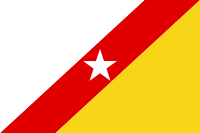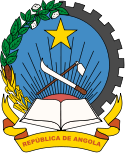- National Liberation Front of Angola
-
National Liberation Front of Angola
Frente Nacional de Libertação de Angola
President Ngola Kabangu Founded 1954 (as the União dos Povos do Norte de Angola guerrilla movement), 1959 (as the União dos Povos de Angola guerrilla movement), 1962 (as the FNLA guerilla movement), 1992 (as a party) Headquarters Luanda, Republic of Angola Ideology Centrism,
Christian democracy,[1]
Nationalism,[1]
Democracy,[1] Conservatism[2]Political position Centre Website http://www.fnla.net/ Politics of Angola
Political parties
ElectionsAngola 
This article is part of the series:
Politics and government of
Angola- Constitution
- President (List)
- Vice-President
- Cabinet
- National Assembly
- Speaker
- Political Parties
- Elections:
- Provinces
- Municipalities
- Communes
- Civil war
- Foreign relations
The National Front for the Liberation of Angola (Portuguese: Frente Nacional de Libertação de Angola) was a militant organization that fought for Angolan independence from Portugal in the war of independence under the leadership of Holden Roberto. The FNLA became a political party in 1992.
Ahead of the first multiparty elections in 1992, FNLA was reorganized as a political party. FNLA received 2.4% of the votes and won five Members of Parliament. In the 2008 parliamentary election, the FNLA received 1.11% of the vote, winning three out of 220 seats.[3]
Contents
Foreign support
Over the course of many years, the governments of Algeria, Western Germany, Ghana, Israel, France, Romania, the People's Republic of China, South Africa, the United States, and Zaire actively supported and aided the FNLA.
The French government supplied men and loaned 1 million pounds sterling without interest.[4][5] The U.S. government began aiding the FNLA in 1961 during the Kennedy administration, and rerouted one-third of official aid to Zaire to go to the FNLA and UNITA.[4][6]
The Israeli government gave aid to the FNLA between 1963 and 1969. Holden Roberto visited Israel during the 1960s, and FNLA members were sent to Israel for training. During the 1970s the Israeli government shipped arms to the FNLA through Zaire.[7]
The People's Republic of China began supplying the FNLA with arms in 1964. It gave the FNLA military equipment and at least 112 military advisers.[8] The Romanian government delivered arms to the FNLA in August 1974.[9]
See also
- Revolutionary Government of Angola in Exile
- African independence movements
- Luanda Trial
- "Colonel" Callan
- Charlie Christodoulou, Angolan War Mercenary
- Peter McAleese, Angolan War Mercenary
- Angolan Civil War
References
- ^ a b c Projet de Societé, official FNLA website (French and Portuguese)
- ^ Consulado Geral de Angola
- ^ National Electoral Commission website (Portuguese).
- ^ a b AlʻAmin Mazrui, Ali (1977). The Warrior Tradition in Modern Africa. pp. 226–228.
- ^ Walker, John Frederick (2004). A Certain Curve of Horn: The Hundred-Year Quest for the Giant Sable Antelope of Angola. p. 143.
- ^ Wright, George (1997). The Destruction of a Nation: United States Policy Towards Angola Since 1945. p. 9.
- ^ Beit-Hallahmi, Benjamin. The Israeli Connection: Whom Israel Arms and Why. p. 65.
- ^ B. MacDonald, Scott (1993). European Destiny, Atlantic Transformations: Portuguese Foreign Policy Under the Second Republic: 1974-1992. p. 56.
- ^ Wright, George (1997). The Destruction of a Nation: United States Policy Towards Angola Since 1945. p. 57.
Further reading
- Chris Dempster, Fire Power (first hand account of foreign mercenaries fighting on the side of the FNLA) [1]
- Peter McAleese, No Mean Soldier
External links
Political parties in Angola 
Parliamentary parties: National Liberation Front of Angola - National Union for the Total Independence of Angola - Popular Movement for the Liberation of Angola - Social Renewal Party - New Democracy Electoral UnionOther major parties: Minor parties: Categories:- African and Black nationalism
- Guerrilla organizations
- History of Angola
- Military history of Angola
- Political parties in Angola
- Secession in Angola
- Secession in Portugal
Wikimedia Foundation. 2010.
